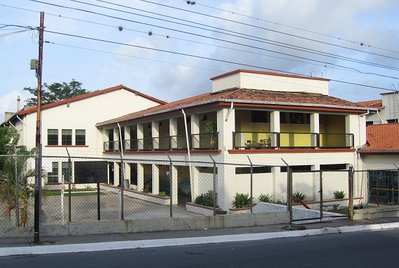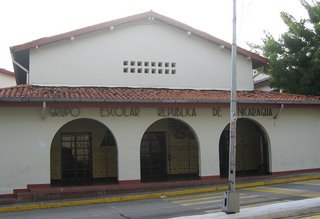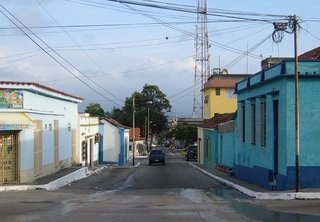
The Republica de Nicaragua has nice airy spaces, high ceilings to fight oppressive heat, enough recreation room around, although today it is like any Venezuelan school, quite overcrowded. The racket that comes from the school grounds at recess is nearly unbearable. It had a handsome entrance which is now rarely used as traffic had made it safer to have the kids enter through the side. This school was actually built on a choice location, at a corner of the Bolivar square of San Felipe. All here know where the Republica de Nicaragua is. Most important leaders of the state sat on its benches.

In the days where the school was built San Felipe was a very modest State Capital, with no more than 30 000 people. Then all could walk everywhere. You went walking to your job, early in the morning, usually no more than 3-4 blocks from your house. You could go back home for lunch and have time for a “siesta” during the warm hours of the day. And come back, walking again, for a late afternoon end of working day. There is still a flavor of these halcyon times. San Felipe still closes down from 12 to 2, some stores even until 3 PM. Many people still can afford to go back home for lunch, driving now. But this street below is still a little bit as it used to be. It is the block that goes down to the School. You can see the one floor homes, without garage entrance as in those days you did not even have good roads where to drive, and less money to buy a car. All “casa” are painted with vivid colors, though all rather modest structures even if they seat over rather valuable land now. But the rich have long moved out to the Altos de Yurubi or other neighborhoods, escaping a downtown San Felipe whose narrow streets have become noisy and crowded on week days, where kids cannot play “trompo” in the streets. San Felipe has not been spared by progress.

How did the people that still live around the Republica de Nicaragua vote Sunday 3? By all means, that area has long ceased to be a fancy area. People who live here have been established for decades, and tend to be retirees or public employees. Workers commute from further areas such as Higueron or Albarico or Cocorote. Qualifying this area as a middle class would be an exaggeration: on the other side of the Bolivar square the streets do not look as nice as the one above, and people also vote at Republica de Nicaragua. There are the results according to the CNE page: of the 1637 votes cast in this school, 930 went for Rosales and 676 for Chavez. That is, Rosales won with 57,83% of the votes. And Primero Justicia only got 8,58%. In a nutshell, the Republica de Nicaragua illustrates quite well the deep divide in Venezuelan electorate.
The opposition basic quality
The opposition voter is very different form the chavista voter. Certainly there are rich people who vote for Chavez, and there are poor people who backed Rosales with full enthusiasms, there are enough pictures from the campaign to bear witness for that.
The cleavage between the two sectors, the polarization that Chavez has been promoting has been as much at the level of a self reliance outlook on life in the population, as for a poor versus rich strategy. This is why the groups of chavista voters that I described in a previous post have been congealing more and more around Chavez, ignoring his threats of Socialism of the XXI century, his anti US silly rhetoric: they all just care about what Chavez will provide them.
The opposition voter is not expecting anything from Chavez: that voter knows that it will get something out of his work or her wits, or because they already have it and owe nothing to Chavez. After 8 years of Chavez rule they harbor now no illusion about him. This is a tremendous psychological barrier that Chavez promotes in his discourse and that the opposition finds very difficult to breach. This is perhaps the very basic reason why the opposition must still resort to device like “Mi Negra” cash program for the poor to try plant a wedge in the chavista electorate. It has not been very successful it seems.
And this is also why we find a division in such a neighborhood as the Republica de Nicaragua. In this neighborhood where coexist professionals and shopkeepers we also have public employees, workers and retirees. We have independent and semi dependent folks and they all decant accordingly. It would not be so bad if Chavez were more willing to develop a middle class of self reliant people, but that he does not want. All his projects are designed to grow the dependency of the people either from the state or the community from cooperatives to mutual vigilance through neighborhood committees.
Basically, the discourse of solidarity does not reach that opposition. They instinctively know that the price to pay for that alleged socialist solidarity is the submission to Chavez, a price they are not willing to accept. The implications for their future are obvious.
The variety within the opposition
But the task to rally all the opposition electorate is not easy for its leaders. The opposition electorate is much more fragmented than one might think since they all share that basic value of self reliance. But self reliance also includes individuality and implies cohesion problems. The opposition voter is not as willing to submit him or herself to the whim of a leader.
Unfortunately this self reliance quality makes it more difficult to divide the opposition into the rather neat groups that could describe the bulk of the chavista voter. Still, some groups are clearly identifiable.
The “Republica del Este”
This is the easiest kind of opposition to identify. They are the ones who watch Globovision, do not miss a march and believe that all think as in the Eastern suburbs of Caracas. Many of them do not like to drive more than half an hour away to Caracas unless it is to their country side cottage or to the beach or to Margarita Island. They fly to Merida.
They are the matrons who this week were calling to rant and rage about the electoral results, refusing to accept them, claiming all sorts of fantastic fraud schemes (some actually plausible) and assuming that the rest of the country voted as in El Cafetal where Chavez was trounced with a mere 10,93% of the vote. They also appear in lesser amounts in Valencia and some upper class areas of provincial cities, but not with the same loudness.
But they are also many of these politicians who think that appearing on TV is enough to build an electoral base. Or who think that abstention will cure all the ills of democracy.
In short they have no clue as to what is going in Venezuela. This blogger has had to face many of them, from friends refusing to come and visit him in San Felipe to people telling him to stop making excuses for Chavez. One of their main figures is Patricia Poleo, now in exile. The brighter of the lot lead the media contra movement such as Colomina or Blanco. If sometime they exaggerate some of their claims, they are an unflappable beacon of principles, never hesitating to even risk their lives in the battle for which they deserve admiration. The politicians of this lot mercifully seem to finally disappear, such as Ledezma.
The “chevere”
You might want to say what you like about the previous group, but they are activist, they march, they protest, they defend their rights. The Chevere does not necessarily do so.
Two week ends ago Rosales gathered an immense march in Caracas. Some put it at 900 thousand +, I did not think it was much more than 500. But it was a huge march, somewhat diminished in size by the blockages on the roads that chavismo had set around Caracas. Yet, only 701,933 people voted for Rosales in Caracas 5 metropolitan townships… Where were the near one million marchers that supposedly showed up for Rosales rally? Did that many of them manage to cross the blockades? Even the total votes for Miranda was barely 500 000. And we all saw the pictures, there were less people at Chavez rally than at the Rosales rally. What gives? Electoral Fraud?
Or perhaps the rally was full of the Chevere. This individual might not miss a march but could never be bothered to register to vote. This individual might be excoriating Chavez but will not miss the beach two weeks in a row. It is that rather nice, fun loving Venezuelan, who cannot be bothered with responsibility, who has no problem going to march for Rosales but will not go to vote one week after because “it is not cool to vote since the government will cheat anyway”. You might think that this is a little bit of a caricature but I can assure you that there are quite a few of them. There is no leaders to point out as coming from that group and it is easy to guess why.
The “adeco”
This group might not have voted for AD in decades but it still thinks like an Adeco. The only reason it did not go over to Chavez is because he has a definite aversion to military men in public office. This is the old Venezuela, the one that has it roots from the time of Gomez, the one that had no problem going over to Copei when this one decided to look like AD to reach office. They used to be public servants, teachers, shopkeepers. They live mostly outside of Caracas, outside even of Valencia or Maracaibo.
They are the ones who voted URD in Monagas. They are the ones who filled up UNT votes in the Llanos or the Andes. They are also the most passive group within the opposition, and without any leader representing them except for the local council man, the trade union representative. But they are the ones who decide local elections. Many of them, by the way, voted in Republica de Nicaragua, using the Convergencia label.
The “musius”
This rather old term refers to the foreigners of European origin, a deformation of the pronunciation of Monsieur in local slang. But they are still a reality. If the bulk of the Latino American immigration seems to have gone to Chavez, the bulk of the European one forms some of the staunchest anti Chavez groups. Not only them, but their descendants too. These are the ones who emigrated to Venezuela to make it their new country, and the ones that were the main development motor in the second half of the XX century. You can also add to them the ones that came from Cuba after 1958. They are certainly not willing to put up with a Socialism of the XXI century that they escaped from in Europe.
They are mostly to be found in business where some of them like Escotet (Banesco bank) went over to the dark side. But you can find them in the media (Granier). Politics are more difficult for them as Venezuelans have traditionally been weary of anyone that is not at least two or three generation in. Which is unfair because these people, like this blogger, are Venezuelan by choice and not by accident.
The “estoy con Teodoro”
This last group is the limited amount of intellectuals, many if not most might never in their lives vote for Teodoro Petkoff. But they share with him the rare intellectual approach to Venezuelan ills. They might come form the guerilla years like Teodoro himself, or they can have evolved on their own, but from their newspaper column or from their blogs or their university pulpits they are implacable against all of Chavez vulgarity and obscenity while always recognizing the need for social reform. They control the web, the newspapers that people are willing to pay money for, and the independent and private universities. Chavismo has no intellectual worthy of the adjective. Only a few rather mediocre imports who try to burnish some ideology to justify a military regime.
Unfortunately "teodoristas" are distrusted by most of the opposition and feared by chavismo who knows full well that they see right through them. They will thus have to be dealt with at some point.
The opposition entelechy
The opposition voter is a driven self reliant voter. It is also an above average educated voter. It is now more than ever the very largest bulk of the Venezuelan middle class, from the office clerk, the qualified worker to the business magnate. But that also cause a problem for the opposition. It is by definition fractious and will only agglomerate on occasion and not completely. By polarizing the country as Chavez has done he has succeeded in reducing it to its core and can thus control it better while the co-dependents that follow him approve of his abuses. But at the same time Chavez deprives himself of the human resources that are within the opposition, people who will show more and more self centered attitudes as they cannot find anything within the state that can please them.
There is a farcical result in the elections. Chavez tried to create a couple of years ago a group called “clase media en positive” which was supposed to demonstrate the bounties of the revolution to the Venezuelan middle classes. But the rare folks who joined it where public servants and a few rare revolutionary capitalist. Undaunted they reorganized it into a political party called “clase media revolutionaria”, revolutionary middle class. They got 0.59% of the votes cast.
Tags:
No comments:
Post a Comment
Comments policy:
1) Comments are moderated after the sixth day of publication. It may take up to a day or two for your note to appear then.
2) Your post will appear if you follow the basic polite rules of discourse. I will be ruthless in erasing, as well as those who replied to any off rule comment.